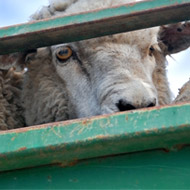Local abattoir network verging on collapse, report finds

The closure of local abattoirs is bad for animal welfare and bad for the environment.
The UK’s network of small local abattoirs is verging on collapse, according to a report by the Sustainable Food Trust (SFT).
The organisation says that unless the government takes urgent action, consumer choice will suffer because the marketing of locally-produced, traceable meat will no longer be feasible. This is because of the closure of many smaller, local abattoirs and the cost of transporting livestock further for slaughter.
According to the report, the number of small abattoirs in England has declined by 34 per cent in the last decade, from 96 to 63. Reasons for the closures include a high burden of regulation, falling cattle numbers and the low and sometimes negative profitability on the sector.
In response to its findings, the SFT has made three recommendations regarding the current crisis:
• a government statement of support recognising the importance of local meat processing plants
• the introduction of mobile red meat abattoirs to enable on-farm slaughtering in an economically viable way
• the establishment of an independent task force to undertake an urgent review to establish why small abattoirs are closing.
Richard Young, policy director of the SFT and co-author of the report, said that local abattoirs play a vital role in all rural communities where farm animals are kept.
“When they close, both animals and meat have to be transported much further. This is bad for animal welfare and bad for the environment. It also threatens the ongoing renaissance of local food cultures,” he said.
Phil Stocker, chief executive of the National Sheep Association added: “This timely report draws attention to the rapidly changing and complex crisis facing smaller local abattoirs and those who depend on them. I truly hope that government and industry will work together to offer a long-term future for our diminishing network of local abattoirs before it is too late.”



 The Federation of Independent Veterinary Practices (FIVP) has announced a third season of its podcast, Practice Matters.
The Federation of Independent Veterinary Practices (FIVP) has announced a third season of its podcast, Practice Matters.